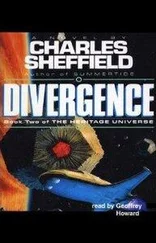Art nodded, and felt totally bogus.
“My name is Yasmin Silvers.” She paused expectantly and held out her hand.
“Dana Berlitz.”
Art leaned across. “Art Ferrand.”
“Were you going back to Washington anyway?”
“North of there,” Dana said, and Art was glad she was not more specific.
“Well, then this trip won’t be totally wasted for you. And you will be doing a valuable service.”
“I don’t know about that,” Dana said, while Art wished she would just shut up so the woman would go away. “It’s my impression that Washington wouldn’t recognize a service if it fell on them. The sooner I’m out of there, the better.”
“You’ve had bad experiences?”
“More like no experiences. Even before the supernova, I could never get anywhere with the government. What it’s like today I can’t even imagine. It’s always an endless trail of forwarded messages and useless holograms. I can never tell if it’s the people who are halfwits or the smart programs derived from them. We’ll get there this time, and either have to talk to a machine or some dim gas cloud of a bureaucrat.”
Art caught on to what Dana was doing. People who are in trouble rarely cause more trouble; they want to draw as little attention to themselves as possible, so they keep quiet and don’t complain. Dana’s aggrieved air was very persuasive.
The woman smiled for the first time. It lit up her face and made her even more attractive.
“I’m sorry you’ve had such rotten experiences in the past, and have such a low view of government services. But tomorrow, I really think you’ll have the ear of someone who can get things done.”
She walked away to a seat closer to the front of the converted bus.
“And you thought she was gorgeous before she smiled,” Dana said. “Tomorrow, eh? I guess we’re stuck with a night in Washington.”
“And a bed,” Art added. “I can feel my skeleton poking through and touching the metal. A bed, a bed, my kingdom for a bed.”
“Me, too. And a shower, even more than a bed. I wonder where Seth will sleep tonight?”
It was the wrong question. Art, just beginning to feel that he could relax, thought again of his cabin in Catoctin Mountain Park. Dana, sensing the change in his mood, said nothing more. The buses started moving and rumbled their way north, while the two sat in silence. Snow still lay on the fields and by the side of the road, but the air was warm as early summer. The solid partition across the bus’s cargo compartment supported Art on his right, Dana’s thigh was a comfortable presence on his left. Despite the discomfort of the seat he found himself drifting off.
It was a change in the note of the engine that brought him back to the present. The bus had stopped. It was deep dusk.
“Are we there?”
“No.” Dana was leaning far out over the side. “We’re nowhere. There’s a kid standing by the side of the road. Maybe seven years old. He only has pants and a shirt — no shoes — and he’s crying. We’ve picked him up.”
“Good.” They were moving again. Art was ready to settle into a dazed but hungry torpor when Dana suddenly asked, “What’s the current world population?”
“Eh? The population. Today it has to be anybody’s guess. Before Supernova Alpha I think it was about eight billion.”
“Right.” She leaned toward him and laid her head on his shoulder. After another minute she added, “You know, we get it all wrong. We say the supernova was a disaster.”
“Are you suggesting it wasn’t ?” Art loved Dana’s head on his shoulder and the soft hair against his cheek, but her comment made no sense at all.
“I’m telling you it wasn’t. It wasn’t a disaster, a single disaster. It was eight billion separate and individual disasters — to you and me and Yasmin Silvers who lost her brother, and Desmond Lota’s family, even if they don’t know he’s dead and that poor little boy we just picked up. They are all disasters. Every one of them was awful, and every one is important. But all we’ll ever learn about in detail is maybe half a dozen.”
“Mm.” She was right, of course.
“But you don’t feel like discussing it,” she said, reading Art’s mind. “That’s all right. You don’t have to. I’m just talking philosophy.”
“Mm.”
“Better that than politics, if I know you. Don’t worry, I won’t talk either one. Have your nap, sweetheart.”
Art felt like saying he had been doing fine with the sleeping before he was interrupted. Instead he closed his eyes and decided that he was just like Joe’s dogs. You could cuss and swear at any one of them as much as you liked, and all the dumb thing heard was its own name. The mutt sat there and thumped the ground with its tail every time it heard that one word.
What Dana had been saying for the past few minutes was already fading. The only thing Art had transferred to long-term memory was that she called him sweetheart.
Grace Mackay left Saul’s office at close to two o’clock. He worked nonstop for the rest of the afternoon, devouring his backlog of calls and throwing off decisions with a speed and energy that had Auden Travis in a daze. Dozens of items were delegated to agency heads, with a brief scribbled note: Handle as you consider appropriate, feedback to me only if problems.
At five-thirty, Saul poured himself a stiff single malt on the rocks. He went on working. At five forty-five he refilled his glass with ice and whiskey.
At six precisely, Auden stuck his harried head inside the door.
“You told me not to tell you before six o’clock whether or not Mrs. Goldsmith had arrived. It is now six. Mrs. Goldsmith arrived at five-thirty. Major Gallini took her to the small west wing dining room, poured her a glass of white wine, and sought to engage her in conversation. She expressed a preference to be left alone, but asked him to leave the bottle.”
Travis seemed tired, but he also had an air of excitement. Saul looked for, and did not find, any hint that the aide disapproved of what he must surely regard as a coming presidential tryst.
“Thank you, Auden. Would you please pass the word to Mrs. Goldsmith that I will join her in ten minutes.”
“Certainly, sir.”
Auden retreated. Saul swirled melting ice cubes in his tired drink and drained the remaining half inch of whiskey. He walked over to the portrait on the wall and spoke aloud to it.
“I’m nervous, you know.”
“I realize that.”
“What would you advise, Dizzie, speaking as an old friend?”
“Marry an older woman, as I did. Mary gave me both a fortune and unceasing devotion.”
“Isn’t it rather late for me to consider that solution?”
“I do not see why. In political terms, you are a young man.”
“But this isn’t politics. You were only in your early thirties when you married. I’m in my mid-fifties. Anyway, I wasn’t asking for advice in the long term. I meant, what would you advise for tonight.”
The room remained silent. The hologram projection area sat empty, as it had been for two weeks.
Another casualty of Supernova Alpha; Saul had loaded into the Persona every recorded word spoken or written by Benjamin Disraeli. The Persona had a realtime bus to every relevant history site. Each incident of the Prime Minister’s life, well known or newly discovered, was contained in the data base, and the Persona employed a state-of-the-art expert system. Two months ago, this dialogue would have been real rather than imagined. The Disraeli Persona would have offered useful advice. Now it was not clear that the Persona existed even in backup storage. Had any of it been placed in a medium unaffected by the electromagnetic pulse?
Читать дальше












